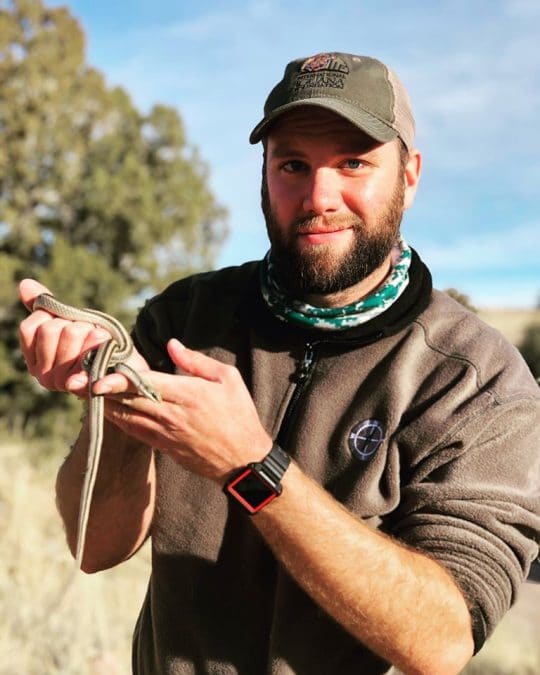While most avoid run-ins with rattlesnakes and other venomous reptiles, Citizen Potawatomi Nation tribal member Brandon Bourassa seeks out animals many are too scared to approach. He, along with his wife Gwyn, own and operate Bourassa Wildlife Consulting in Albuquerque, New Mexico. The couple serves as animal consultants on TV and movie sets across the state, ensuring the well-being of cast, crew and animals alike. The business provides income while they complete their undergraduate degrees in geography and biochemistry at the University of New Mexico.

“New Mexico is home to many incredible filming locations, but those locations pose some important considerations for productions to consider,” Bourassa Wildlife Consulting’s website noted. “The most important consideration for any film project is the safety of the cast and crew. … All venomous snakes are handled using the safest methods for both people and animals.”
Some of the major projects that Bourassa’s business contracted with include The Kid starring Chris Pratt, Paramount Network’s miniseries Waco, Netflix’s Chambers and more.
“I’ve always been a reptile nerd — that was from the beginning,” Bourassa said then laughed. He began handling wildlife in his youth and enjoyed opportunities to explore on his grandfather’s land in southern Pottawatomie County.
“My grandpa, he’s always been interested in rattlesnakes, too,” he said. “He’d take us out looking for rattlesnakes as a kid. He hunts them, which is a little different than what I do.”
Before he was old enough to work, Bourassa volunteered at the Bob Jenni Nature Center in Edmond, Oklahoma. He accepted his first job after high school at the Oklahoma City Zoo as a keeper in the children’s zoo. But for the past three years, he has traveled from set to set across New Mexico while juggling his undergraduate studies.
“In New Mexico, pretty much every production that’s shooting outside hires one of us because they’re shooting out there where there’s rattlesnakes, and most of those people are from (Los Angeles). And they’re very concerned about wildlife,” he explained.
Process
One of Bourassa Wildlife Consulting’s main goals includes ensuring that each film set is safe from potentially harmful animals.
“I usually look at the script and see where they’re going to be moving for the next scene, and that’s where I’ll go check for snakes,” he said.
When he captures venomous snakes, he places them in a safe holding container to release back into the wild once production ends.
“Sometimes, if it’s a really impressive animal, I’ll keep it and use it for films,” he added. For example, Bourassa was able to provide a live rattlesnake for the recent filming of Netflix’s drama mystery Rattlesnake.
Bourassa also takes steps to protect nature from potential human threats. According to the Bourassa Wildlife Consulting website, “In addition to temporarily removing venomous snakes from a location, we will also take measures to protect other wildlife from potential threats like vehicle and foot traffic.”
Balance
His job also offers an opportunity to educate others on the important roles animals like snakes and other predators play in overall environmental health.
“You can talk to them about the importance of the ecology and why we’re protecting them and not just killing them on-sight,” Bourassa said. “I appreciate that about the film industry. Even though it can be pretty destructive in some situations and not so great for the environment, they at least hire us to protect some of these animals.”
Rattlesnakes help control small mammal populations like mice and rats.
“You don’t want to let rodents get out of control, especially where I am living in New Mexico, where we have a lot of viruses — the bubonic plague — so you want to be careful with killing predators,” he explained.
Through his work, Bourassa hopes more people and communities will think about the ecological impact all animals of prey have.
“The problem really is exaggerated. You always hear stories — ‘They’re killing my cattle,’ but cattle are smart enough to walk away when they hear the rattles,” Bourassa said. “Maybe every now and then there’s an accident, but really, it is people that are dumb enough to mess with them.”
He noted some communities that once hosted rattlesnake roundups, which encourage the wholesale slaughter of rattlesnakes, have switched to celebrating the species.
“I think that’s the model for the future. You can still have your rattlesnake festivals and contribute to your economy, but just get the family together and enjoy the animals,” Bourassa said.
Future
The CPN tribal scholarship helps support Bourassa as he pursues a geography degree, which he plans to complete later this year.
“The scholarship has been extremely helpful,” Bourassa said. “I definitely wouldn’t be able to pay for college without it.”
He chose to study geography for the vast opportunities and fields of study under its umbrella.
“It’s anything from a spatial perspective,” he explained. “Lots of people go into urban geography or meteorology — those are all subfields of geography — but my interest is in wildlife conservation, and that’s definitely within the realm of geography and environmental studies also.”
After graduation, Bourassa hopes to continue working with animals, mainly crocodilians, and to have a more regular work schedule. However, his film industry interest may encourage Bourassa Wildlife Consulting to continue its operations.
“I got a lot of good stories out of it — getting to meet all these celebrities,” he said. “Which I’ve never really been super excited about celebrities, but it’s fun whenever you’re watching TV and you can say, ‘I worked with that guy!’”
Learn more about Bourassa Wildlife Consulting at bourassawildlife.com.
